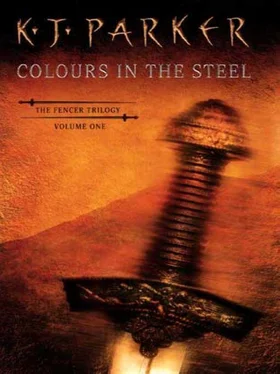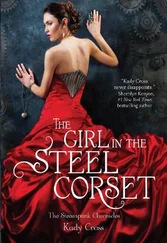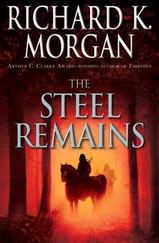K Parker - Colours in the Steel
Здесь есть возможность читать онлайн «K Parker - Colours in the Steel» весь текст электронной книги совершенно бесплатно (целиком полную версию без сокращений). В некоторых случаях можно слушать аудио, скачать через торрент в формате fb2 и присутствует краткое содержание. Жанр: Фэнтези, на английском языке. Описание произведения, (предисловие) а так же отзывы посетителей доступны на портале библиотеки ЛибКат.
- Название:Colours in the Steel
- Автор:
- Жанр:
- Год:неизвестен
- ISBN:нет данных
- Рейтинг книги:4 / 5. Голосов: 1
-
Избранное:Добавить в избранное
- Отзывы:
-
Ваша оценка:
- 80
- 1
- 2
- 3
- 4
- 5
Colours in the Steel: краткое содержание, описание и аннотация
Предлагаем к чтению аннотацию, описание, краткое содержание или предисловие (зависит от того, что написал сам автор книги «Colours in the Steel»). Если вы не нашли необходимую информацию о книге — напишите в комментариях, мы постараемся отыскать её.
Colours in the Steel — читать онлайн бесплатно полную книгу (весь текст) целиком
Ниже представлен текст книги, разбитый по страницам. Система сохранения места последней прочитанной страницы, позволяет с удобством читать онлайн бесплатно книгу «Colours in the Steel», без необходимости каждый раз заново искать на чём Вы остановились. Поставьте закладку, и сможете в любой момент перейти на страницу, на которой закончили чтение.
Интервал:
Закладка:
Bardas smiled; at least, he opened his lips and showed his teeth. ‘You’ve got to catch me first,’ he said; then he turned and started to run.
He’d gone about fifteen yards when the stone hit him.
From the second-city gatehouse, the Lord Lieutenant had a splendid view of the fire; probably the best in the city. It was the sort of spectacle that had to be admired, regardless of the circumstances. The sheer impersonal beauty of the flickering red light was breathtaking. One thing was certain: there wasn’t another man alive who’d ever seen the like.
Fire in the lower city was a nightmare that haunted everybody who held office in Perimadeia. Quite simply, there was nothing anybody could do about it. The place was and always had been a hell of a good bonfire poised and ready to happen. Once a fire managed to get established, it moved faster than a man could run, jumping from roof to roof across the thatched eaves that overhung the narrow streets, surging and swelling as it lit upon oil stores, pitch refineries, distilleries, sulphur bins, grain bins, cloth warehouses, timberyards; it was as if the people of the city had deliberately gone out of their way to provide a relay of inflammable materials, like a string of signal beacons spanning a country.
The critical point was past now; nothing to do but let it burn itself out. Tradition had it that the risk of fire in the lower city was the reason the second city had been founded; a high wall to keep the flames away from the important buildings, the houses of substantial citizens, the libraries of the Order, the offices where vital records were kept. The wall would do its job again, even with the fire-oil lashing up an inferno beyond all precedent. Whether that made him feel better or worse, the Lord Lieutenant wasn’t sure. It meant that in spite of the fire they’d started, the enemy would inherit the second city – and the upper city too, of course, with all its empty wealth of decoration and embellishment – completely intact. The best part of Perimadeia, its beauty and opulence, would survive. Its people wouldn’t.
Two hours ago, the enemy had forced the second-city gate. They’d improvised a highly efficient battering ram out of the driveshaft of the glorious new publicly funded municipal water mill. Three years of diligent searching it had taken to find a single tree trunk long and thick enough to make the driveshaft; then they’d had to pay an exorbitant price for it to the loathsome merchant cartel of Scona, and then a special ship had had to be built up to transport it, the Grand Avenue had been widened (at ruinous expense) to bring it up; special wagons, special cranes – the trouble and expense had been enough to chill the blood. In fact, the administrative part of the Lord Lieutenant’s mind had marvelled at the ease and efficiency with which the enemy had torn the thing out and dragged it, by unassisted manpower, up the hill and against the gate, which had given way like a paper window.
A shout from below told him that the enemy were attacking again. The first attack had pushed them back onto a stretch of wall four towers in each direction on either side of the gate. The second attempt had failed; what remained of the city forces had thrown them back with substantial losses, had even recaptured a further five towers. The third – well, they’d lost fewer than a hundred men at a cost to the enemy of at least a thousand; but here they were, cooped up in the gatehouse and fifty yards of wall on either side, all of the city that remained under the control of the Perimadeian government. It was a realm you could cross in fifteen paces, and the Lord Lieutenant was in sole charge of it. For now, anyway.
On the wall to both the right and the left, the enemy line shuffled forward. The Lord Lieutenant noticed something different, and realised that they’d somehow managed to dig out the old archers’ shields, big wickerwork screens behind which two bowmen could shelter, which had been mothballed at least twenty years ago. They seemed to work just fine; the few arrows left to the city archers were chunking into the wicker as if they were targets in the butts, and the line was advancing steadily. And below-
Below, they appeared to be setting up a couple of torsion engines – ah, yes, the two additional mangonels he’d ordered to fill gaps on the wall, which they’d been due to crane into position tomorrow afternoon. Now the enemy had them, and they appeared to be loading them with medium-sized barrels
… The Lord Lieutenant nodded as he resolved the problem. The barrels were obviously full of fire-oil. A bit risky (drop one short and you’d risk causing damage to the buildings immediately above the wall) but a quick and thoroughly economical way of solving the tactical problem.
The Lord Lieutenant indulged himself with a last view of the city. From this high point he could see the docks – even at this distance he could clearly make out the crowds milling round the docks area, wedged solid in all the streets and roads that led to the harbour district. Everybody must have decided to head for the docks and take their chances; and now the fire was spreading that way, helped slightly by a gentle breeze. It was already licking around the edges of the crowd, and the mere thought of what it must be like down there, trapped between fire and water, crowding in tighter still as the flames advanced, was enough to reconcile him somewhat to the prospect of dying up here in relative peace and quiet.
In the event, the first barrel was a failure. As it flew upward the fuse blew out, and the barrel smashed harmlessly against the top battlements. Well, relatively harmlessly. A fair number of people, including the Lord Lieutenant, were soaked in the fire-oil, which was going to make life interesting as soon as one firebomb did what it was supposed to do.
The second barrel worked just fine, and the engineers watched with dumb fascination as the defenders, their hair and beards suddenly full of fire, streamed out of the choking smoke and melting heat inside the tower, straight into massed volleys of arrows from the archery contingents behind their shields on the wall.
‘All done,’ a captain reported, when it was over. ‘What now?’
Uncle Anakai, who had never seen the like before in all his many years, had regret in his voice when he gave him Temrai’s order. ‘Burn the lot,’ he said, ‘everything that’ll take. But not till we’re through that gate up there – what’s it called? Upper city? Whatever. Shouldn’t take you long to get through there; apparently it isn’t even garrisoned. So, torch the upper city first, then this. And then,’ he added quietly, ‘get yourselves up on this wall before it catches up with you, unless you want to play candles too.’
When he came round, Loredan was lying on his back on the bed of a moving wagon. For a moment he thought he was somewhere else entirely (maybe he’d been dreaming); then he remembered, all too clearly.
He turned his head and saw the outline of Gorgas’ back, silhouetted against an alarmingly red sky. The thing he could feel lying under his left leg was the body of a girl, apparently his niece or what was left of her. He knew without having to check that she was still alive. That’s one of the infuriating things about natural-born pests, the really tiresome and pernicious variety. Knock them about, cut their fingers off, stick them with arrows, hurl them about like stooks of hay; no chance at all of killing them. They’re the ones that always survive, somehow or other. Probably, Loredan realised, why there’s so many of them and so few of us.
Gorgas wasn’t looking at him; his eyes were on the road ahead, a burning house that was starting to slide into the street, a platoon of the clan being herded onto a similar wagon for transport out of danger now that the job was over and the mopping-up could be left to the fire. And that’s what Gorgas is going to do, damn his hatefully intelligent soul; he’s going to creep out of the city in a convoy of enemy wagons. Then all he’s got to do is slip away, find a boat or a small raft, and paddle out to meet this ship of his. The part that really burns me is, I’d never have had the wit to think of that.
Читать дальшеИнтервал:
Закладка:
Похожие книги на «Colours in the Steel»
Представляем Вашему вниманию похожие книги на «Colours in the Steel» списком для выбора. Мы отобрали схожую по названию и смыслу литературу в надежде предоставить читателям больше вариантов отыскать новые, интересные, ещё непрочитанные произведения.
Обсуждение, отзывы о книге «Colours in the Steel» и просто собственные мнения читателей. Оставьте ваши комментарии, напишите, что Вы думаете о произведении, его смысле или главных героях. Укажите что конкретно понравилось, а что нет, и почему Вы так считаете.












